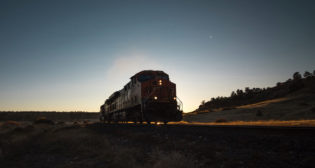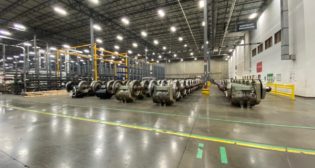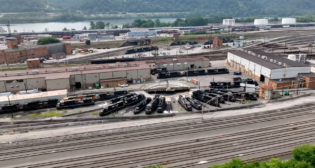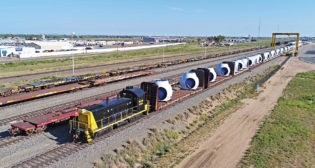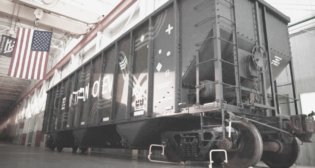
Supply Side: Wabtec, Cummins, VLI/Progress Rail, Parsons, Alstom
Written by Carolina Worrell, Senior Editor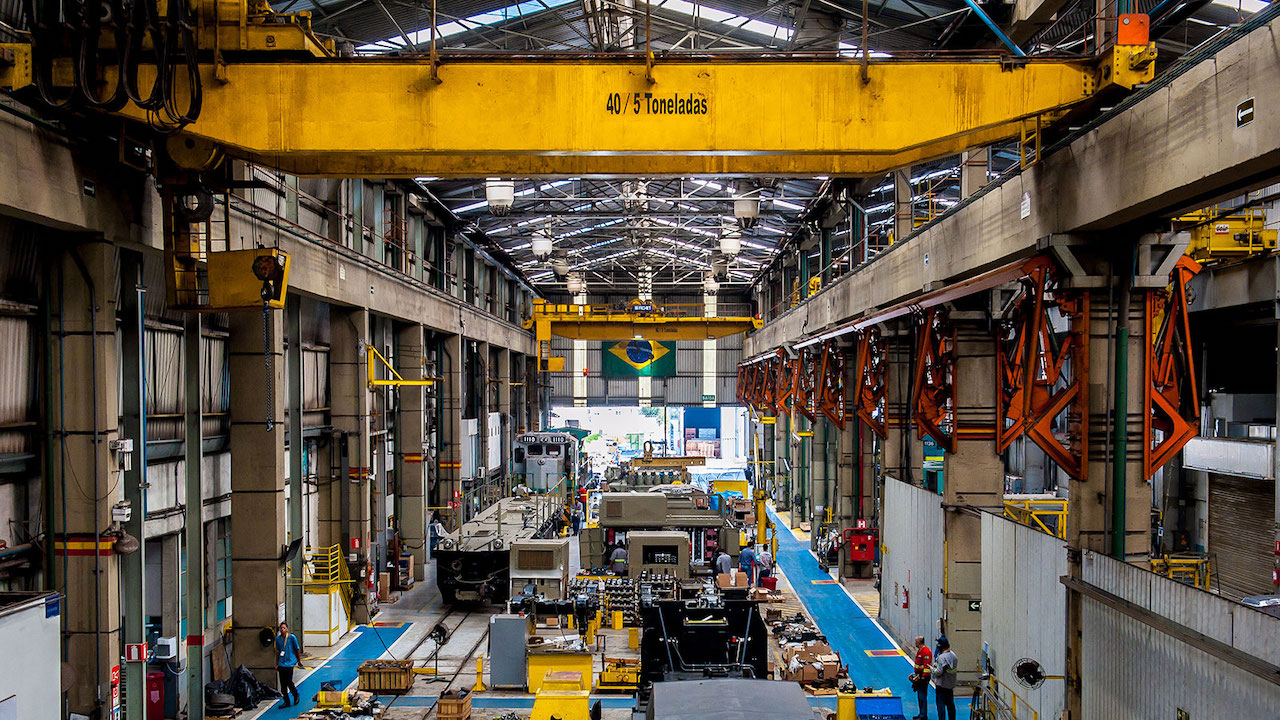
Wabtec photo
Wabtec signs its first locomotive deal with Grupo RAS in Uruguay and offers a behind-the-scenes look at its brake pad manufacturing plant in Germany. Also, Accelera™ by Cummins commissions its first fuel-cell powered locomotive for Austria’s HY2RAIL project; VLI signs a contract to acquire eight EMD® locomotives from Progress Rail; Parsons wins position on a $1 billion contract to support Washington Metropolitan Area Transit Authority (WMATA) projects; and a new report highlights the influence of Alstom’s more than 170 years of work across the nation.
Wabtec
Grupo RAS, a Uruguay-based multinational integrated logistics company with more than 30 years of experience, announced March 13 an order for three C23EMP locomotives from Wabtec, “marking a crucial step for Grupo RAS as it enters the Uruguayan railway market.”
“This deal with Wabtec is a cornerstone for Grupo RAS,” said Grupo RAS President and Founder Ruben Azar Scarone. “It allows us to integrate rail transportation into our portfolio for the first time, offering unmatched efficiency and competitiveness to our clients. Not only will this boost Uruguay’s position as a gateway for Mercosur markets, but it will also significantly improve connectivity within the region, facilitating faster and more cost-effective export and import operations.”
According to Wabtec, the C23EMP locomotives are designed for reliable light-axle-load operations on narrow-gauge tracks. The locomotives are equipped with fuel-efficient, electronically-fuel-injected 12-cylinder FDL engines. Wabtec will manufacture the locomotives at its plant in Contagem, Brazil. The locomotives are expected to be delivered by late 2025, marking the commencement of Grupo RAS’s rail operations in Uruguay.
The investment, the company says, “aligns perfectly with Grupo RAS’s vision to become a key operator within Uruguay’s revitalized national railway network.” The company will operate three subsidiaries, focusing solely on rail transportation along the crucial Route 5 and other national routes. This expansion, the company adds, “strengthens Grupo RAS’s position as a comprehensive logistics solutions provider and enhances its strategic location at the Port of Montevideo and its nearby industrial park, offering customers seamless railway access.”
“We are thrilled to support Grupo RAS in this ambitious endeavor,” said Danilo Miyasato, President and Regional Leader of Wabtec for Latin America. “These locomotives will provide Grupo RAS the performance and reliability needed to be successful. This order also allows us to expand our presence in Uruguay, where we have a longstanding history, and further solidify our commitment to the Latin American market.”
In related news, Wabtec is helping to put the brakes on trains, making the transit industry “more efficient, reliable, safe and sustainable.” The friction materials are a critical part of a train’s braking system. Wabtec has implemented a state-of-the-art production system to make rail friction materials cleaner and more sustainable. The company recently captured video of this unique manufacturing process. Check out the video (below) showing the end-to-end production of organic friction pads.
The automated manufacturing process, Wabtec says, “increases production quality and enables employees to focus on value-added work rather than repetitive tasks.” The manufacturing approach also supports Wabtec’s Green and Blue Friction product lines. Green Friction reduces the amount of fine particulate matter emissions generated from braking by up to 90%. The Blue Friction products minimize the use of chemicals or materials that have the potential to pollute water and harm marine life.
The plant located in Recklinghausen, Germany, is completely powered by green electricity and is “setting a production standard for friction materials,” Wabtec said.
Cummins
Accelera™ by Cummins, the zero-emissions business segment of Cummins Inc., has reached a significant milestone by successfully commissioning its first fuel-cell powered locomotive for freight rail applications.
Replacing typical diesel generators, Accelera fuel cells now serve as the primary power unit in the conversion project of a light On Track Machine (OTM) Vehicle in Austria developed for the HY2RAIL project.
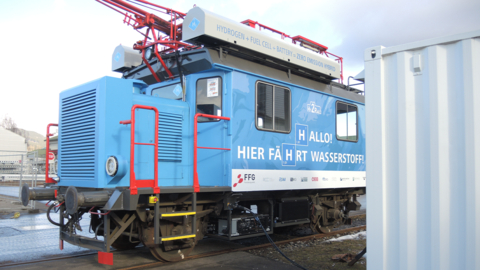
In partnership with the Austrian railway authority ÖBB, recognized for managing one of Europe’s most advanced railway systems, the HY2RAIL project demonstrates how fuel cells can sustainably meet the power needs of heavy-duty freight locomotives.
To power the locomotive, m.ZERO, an Austrian engineering consultancy, integrated Accelera fuel cell power modules into a strong 120kW system. This customized system, Cummins says, meets strict rail vehicle standards, including the European standard EN 61373, which outlines testing requirements for railway applications, focusing on shock and vibration.
Furthermore, m.ZERO oversaw the integration of all balance-of-plant components and interfaces in collaboration with Accelera. The fuel cell system was then combined with a ternary battery system to create a hybrid propulsion system that includes cutting-edge power electronics, on-board hydrogen storage technology, a vehicle control unit, and software. This integration was led by m.ZERO in partnership with project leaders Hy2RAIL.
ÖBB’s technical service arm, TrainTech, played a pivotal role in overseeing the railcar’s modernization. The transformed locomotive was previously an OBB X534-type catenary construction and maintenance railcar, reliant on a diesel-electric propulsion system. Following installation of the new fuel cell electric system, it now runs emissions free.
“Expanding our fuel cell technology into locomotives for freight reinforces our standing as a premier fuel cell provider in the European market, particularly for the railway sector,” said Accelera General Manager of Fuel Cell and Hydrogen Technologies Alison Trueblood. “Alongside our experience with passenger trains, this project enhances our ability to support the dynamic rail market, further demonstrating the viability of hydrogen technology for zero-emissions heavy-duty transport.”
“We made the right decision with our choice of fuel cells for the project as Accelera’s units are delivering exactly as specified,” said m.ZERO CEO Herbert Wancura. “Modernizing to zero-emission technology isn’t just feasible, it’s an economically and environmentally savvy choice. We are ready to support rail OEMs in their zero-emission endeavors and eager to collaborate with Accelera again on any upcoming projects.”
The H2Rail project brought together the strengths and expertise of leading rail organizations and received co-financing from the Austrian Research Promotion Agency.
VLI/Progress Rail
VLI, a Brazil-based logistics solutions company that operates ports, railways and terminals, has signed a contract with Progress Rail, a Caterpillar company, for the acquisition of eight EMD® SD70ACe-BB locomotives.
These units will be added to the company’s fleet to transport cargo in the Southeast corridor of the Centro-Atlântica Railway, which integrates important producing regions from states, such as Minas and São Paulo, to the Port of Santos. Progress Rail will produce the rolling stock at their Sete Lagoas, Brazil, facility, with delivery planned in late 2025.
With the completion of this deal, VLI will accumulate an acquisition of 20 locomotives in a period of just one year. The other units will be delivered later this year and used in operations by the company in the East corridors—also on the Ferrovia Centro-Atlântica, destined for the ports of Espírito Santo—and North, where VLI operates the North tram of the Ferrovia Norte-Sul.
“VLI is a developmental company and believes that strengthening the logistics infrastructure is essential for the country’s growth,” said VLI Interim CEO and Director of Finance, Supply Chain and Services Fábio Marchiori. “The continuous investment in rolling stock enables an even broader, more efficient and safer service to our customers and, at the same time, represents a strong stimulus to the national railway industry.”
“Through signing this contract with VLI, we continue our investment in the Brazilian rail industry with our EMD® SD70ACe-BB locomotives, which are designed to perform safely and efficiently in the region’s uniquely challenging operating environments,” said Progress Rail Executive Vice President of Locomotives Jack Zhang. “For more than 100 years, EMD locomotives have earned a global reputation for durability, reliability and sustainability, and we look forward to continuing our support of the Brazilian railroads with products made in Brazil for Brazil.”
Parsons
Parsons announced March 12 that the company was awarded a seat on an indefinite-delivery, indefinite-quantity multiple award task order contract (MATOC) by WMATA for multi-disciplinary project and construction management support. The approximately $1 billion ceiling-value MATOC includes a base period of five years, as well as a one-year option period and represents new work for Parsons.
Under this MATOC, Parsons will compete for task orders to provide project management and engineering support services for WMATA’s capital improvement program.
“Metro has been connecting the District of Columbia, Maryland, and Virginia region for decades, improving mobility safely and efficiently,” said Mark Fialkowski, President, North America Infrastructure for Parsons. “We are proud to have partnered with Metro since the authority’s inception in 1967 and look forward to continuing to deliver innovative transit solutions for the authority and the customers it serves.”
Alstom
Alstom on March 14 released its first economic impact report in the U.S., highlighting the company’s impact on the nation’s economy.
An analysis of its activities in fiscal years 2022/23 found that Alstom contributed more than $700 million to the U.S. GDP, and nearly 10,000 direct and indirect jobs, “demonstrating its status as a leader in America’s world-class manufacturing sector, and as the number one private rail operator in the country.”

The report outlines Alstom’s key role in developing and modernizing the country’s transportation network by offering fully integrated rail and transit system projects. Report highlights include:
- “Alstom is a global leader in railway manufacturing, signaling, operations and maintenance, operating in 45 US locations and managing 17 engineering and manufacturing sites in the United States alone.
- “Avelia Liberty, the first-ever high-speed train built in the U.S. is being manufactured with 95% Buy America compliance and 95% of components sourced locally.
- “Automated People Movers designed, manufactured and in most cases maintained and operated by Alstom have transported over 525 million passengers safely and efficiently at 16 airports across the nation.”
To date, Alstom says it has spent more than $590 million with 170 suppliers in 27 states, as part of fulfilling Buy America requirements for the Amtrak Avelia Liberty project. Alstom and Amtrak have also worked in close partnership to meet ambitious small and disadvantaged business enterprise goals.
With investments of more than $87 million in their Hornell, N.Y., manufacturing site, Alstom says it is “set to bring America’s first high-speed rail trains and support many future rail and transit programs in meeting Buy America requirements.” Through the Buy America program, Alstom has strengthened its partnerships with New York State Empire State Development aiming to modernize and expand Hornell and Plattsburgh manufacturing facilities. Providing jobs and in house training at the Hornell manufacturing sites has resulted in local public and private investments worth $200 million in the City of Hornell, which has led to new housing, hotels and restaurants, and infrastructure critical to the health of the community, according to Alstom.
“For over a century, Alstom has had an important presence in the United States and today we provide thousands of jobs across the country and uplifting the U.S. economy,” said Alstom America President and CEO Michael Keroulle. “Alstom has paved and continues to pave the way in developing and modernizing America’s transportation and network. Alstom is dedicated to investing in rail and transit that strengthens communities where the projects are built and also boosts the economy by creating good-paying jobs for American workers.”
Alstom, in collaboration with EY, developed this first Socio-Economic Report in the U.S. to measure its impact in the country and serve as a baseline to build upon moving forward. The full report is available to download here.
